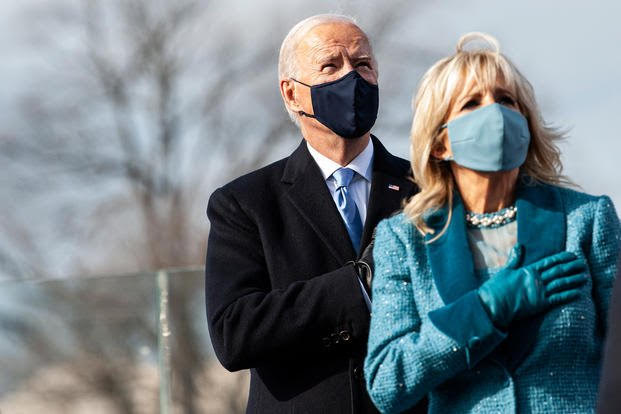Our Call to the New Administration: Put Military Families First
4 min read
As an organization that has stood behind military families for more than 50 years, the National Military Family Association, or NMFA, knows that the challenges they face aren’t getting any easier.
The issues military families experience have been exacerbated by 20 years of continuous war and now the pandemic. And there’s no escape: Families across the services — active-duty and reserve components, all branches, ranks and grades — need the Biden administration’s support so they can continue to support their service members.
Military families know that “together we’re stronger,” the NMFA’s motto. Now is a time to be joined in a cause that everyone supports: a strong and resilient America.
Military families need the new administration to help in four critical areas.
First, no military family should go hungry. But they are. We’ve always known some families struggle, but it’s no longer some families — it’s many. There are three immediate solutions the White House can take:
- Use executive action to reduce the barrier to military families accessing needed help through the Supplemental Nutrition Assistance Program, or SNAP, by excluding Basic Allowance for Housing in determining income eligibility.
- Screen for food insecurity within Defense Health Agency and Department of Defense child care facility enrollments.
- Work with Congress to pass the Military Family Basic Needs Allowance in the administration’s first 100 days.
Military families cannot keep waiting for help to ensure that they can put food on the table. Washington must act now, before another military family is added to the count of Americans who are food insecure.
Second, military families need access to mental and behavioral health resources. A 2020 report by the DoD Inspector General revealed that the military health system routinely fails to meet access-to-care standards for mental and behavioral health care. We can’t let this slide, especially as stress associated with the pandemic has increased the demand for mental and behavioral health care.
We’ve heard from families in crisis who couldn’t get the mental health care they needed in these extraordinary times — when the stress they’re facing is also extraordinary, and all while the DoD assures military families that their mental health needs will always be met. While the long-term solution is complicated, there are two urgent actions that the Biden administration must take:
- Immediately freeze the planned military health system restructuring and medical billet cuts until these urgent needs are met.
- Ensure families have continued access to telehealth.
Third, military families need access to affordable, quality child care. While our nation is experiencing a child care crisis, military families — dealing with deployments, long training exercises away from home, Guard and Reserve activations, and irregular and overnight hours — feel the problem acutely. Military families are counting on Washington to ensure that the services:
- Adequately fund child care fee assistance programs.
- Partner with the community outside the gates to increase accessibility when on-installation wait lists are too long.
- Incentivize child care workers by offering competitive pay, tuition assistance, and debt forgiveness programs.
At the NMFA, we’re committed to continuing to work with the Pentagon on this issue. Our military members cannot do their jobs when their children are not cared for.
While piecemeal solutions are not the answer, there is an immediate solution to affordability (one that the DoD has acknowledged but overlooked for more than a decade): It must make Dependent Care Flexible Spending Accounts available to active-duty service members, the only federal employees who don’t have access to them. The Pentagon could do this tomorrow because it doesn’t require an executive order or legislation; it only requires the DoD’s civilian leadership to put military families first.
Military families are counting on the White House to lead with them in mind, serving and supporting them to make our country stronger.
The NMFA is encouraged to know that the new administration has sent a clear message that military families matter. It has already brought back the military-focused Joining Forces initiative and hired proven military community leaders — military spouses Rory Brosius at Joining Forces and Patricia Barron, the new deputy assistant secretary of defense for military community and family policy — who will focus on the critical issues facing military families.
Finally, we have one broad recommendation that is not pandemic-related but is still important: The DoD should review policies and programs for supporting military families so that they reflect the family unit as defined by the service member, including life partners, common-law marriages and blended families, to ensure that the department recognizes the wide diversity of today’s military families and addresses the special circumstances of military life.
Accordingly, we strongly urge the Biden administration to act quickly on Section 581 of the fiscal 2021 National Defense Authorization Act, which requires the DoD to implement Recommendation Four of the July 2019 report of the National Academies of Science Committee on the Well-Being of Military Families, titled ”Strengthening the Military Family Readiness System for a Changing American Society.”
These are not detailed policy asks. We have those, too: We will ask for help ensuring that Tricare provides the health care military families need; that military spouses have the support of the White House in initiatives that ensure career portability and success, access to educational resources, improvements in the Exceptional Family Member Program; and countless more — but our military families are in crisis. We need to know our families are fed, have access to mental health resources, and that our children are cared for.
Mr. President and Dr. Biden, we call on you and your team to take swift action to make it clear that Joining Forces is truly back — but with a greater emphasis on solutions that military families need now.


